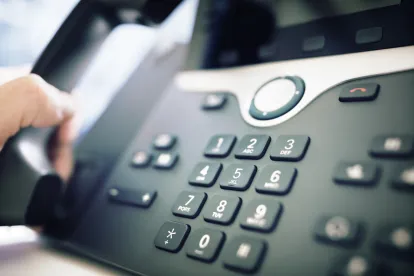Soundboard robocalls use live agents to play recorded messages instead of talking to the person who picks up the phone. Marketers often argue that such technology are not “pre-recorded” because human interaction is necessary to select what audio recordings to play.
The issue of whether soundboard technology are pre-recorded calls under the Telephone Consumer Protection Act has been unclear for some time now.
In April 2018, the United States Court of Appeals for the D.C. Circuit dismissed a challenge to a November 2016 FTC staff letter addressing certain prerecorded calls or “robocalls” using soundboard technology. The November 2016 letter announced that FTC staff would begin treating calls using soundboard technology as robocalls under the Telemarketing Sales Rule.
The Soundboard Association challenged the November 2016 staff letter. The United States District Court for the District of Columbia ruled that the letter was properly issued and did not violate the Administrative Procedure Act’s notice-and-comment requirements.
The Association appealed.
The D.C. Circuit Court dismissed the Soundboard Association’s challenge to the letter, holding that the November 2016 FTC staff letter was not a “final agency action” that would justify review under the Administrative Procedure Act.
Thus, FTC staff continues to perceive calls using soundboard technology as robocalls for TSR purposes. Marketers must possess express written consent prior to calling.
TCPA and telemarketing related litigation continues to proliferate, in part, due to plaintiff arguments that soundboard calls are prerecorded calls prohibited by the TCPA if made without lawful prior consent.
Noteworthy is a recent decision out of the Western District of Oklahoma. Braver v. NorthStar Alarm Servs. et al. (W.D. Okla. Nov. 2019).
Initially, the court held defendants liable for making calls to residential landlines using an artificial or pre-recorded voice, without prior written consent. The defendant had the ruling “reconsidered” and the court found that all uses of soundboard technology are not a per se violation of the TCPA.
In short, the court held that soundboard calls are not “categorically prohibited.” According to the court, however a soundboard call which does not interact with the customer except in preprogrammed, meaningless ways, violates the TCPA
Here, the court found that the defendant soundboard agents utilized a script and that they were required to “press buttons in a certain order” to deliver audio recordings. It held that “every initial call began with the soundboard agent playing the first recording” that was a prerecorded voice stating, “Hello this is Amy, I am a security advisor, can you hear me okay?” Consequently, according to the court, the level of human interaction was largely irrelevant. An FTC defense attorney can assist marketers with interpreting this decision, telemarketing compliance assessments and interrelated consumer privacy issues.
The ruling comes at a time with the constitutionality of the Telephone Consumer Protection Act is in question.
Federal courts in Delaware and Massachusetts have recently heard arguments that the TCPA, on its face, distinguishes between certain kinds of government-backed debt collection phone calls based on their content, therefore rendering the statute unconstitutional. This issue is almost certainly en route to the Supreme Court.




 />i
/>i

